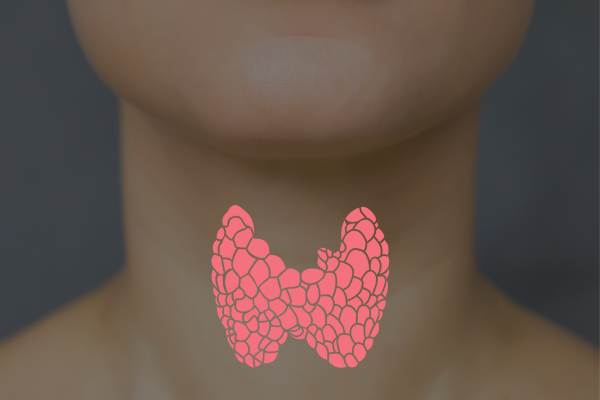
What is the thyroid gland?
The thyroid is a butterfly-shaped gland with two lobes located at the front of your neck, just below your larynx or adam’s apple. This gland shares a close relationship with the hypothalamus, pituitary gland, and adrenal glands.
These relationships are very important as they control the release of hormones throughout the body. For example, when our thyroid hormones are too low, the hypothalamus and pituitary gland communicate to release more thyroid hormone to keep our body balanced. Another example of this important relationship is based within the hypothalamus. This part of our brain controls hormones as they travel to the pituitary gland. From here, they travel to the adrenal glands, constantly moving and communicating to turn the production of specific hormones on and off.
What does the thyroid do and how is it affected?
The thyroid regulates many metabolic functions and affects your growth and bone development, muscle tone, heart rate, circulation, blood sugars, and also plays a role in regulating body temperature.
Many factors can lead to dysfunction of the thyroid gland including genetics, immunity, environment, lifestyle and nutrition.
Some of these dysfunctions are:
1. Hypothyroidism (under active thyroid)
Under active thyroid occurs when the thyroid gland fails to produce sufficient amount of thyroid hormone causing metabolism to slow down too much.
Common symptoms of hypothyroidism:
• Fatigue and low energy
• Weight gain and reduced appetite
• Poor memory and brain fog
• Cold intolerance
• Constipation
• Dry and brittle nails, dry skin and hair loss
• Low mood
• Abnormal menstrual period or fertility problems
• Joint and muscle pain
• Goitre (enlargement and swelling of the thyroid gland)
2. Hashimoto's Disease (under active thyroid autoimmune disorder)
Hashimotos disease is an autoimmune disorder where the immune system attacks the thyroid. Your thyroid may be removed in the case of Hashimoto's because the thyroid becomes too inflamed and unable to produce a sufficient amount of thyroid hormones.
In any autoimmune condition the following areas need to be looked at and addressed: stress and high levels of cortisol, diet, sleep, digestion, nutritional deficiency, inflammation, GIT health and food sensitivity.
3. Hyperthyroidism (over active thyroid)
Hyperthyroidism is the release of too many thyroid hormones into the bloodstream causing metabolism to increase.
Common symptoms of hyperthyroidism include:
• Sweating and heat sensitivity
• Unexpected weight loss and increased appetite
• Goitre (enlargement and swelling of the thyroid gland)
• Irritability, agitation, anxiety and nervousness
• Changes in bowel movements (particularly diarrhoea)
• Rapid heart rate and palpitations
• Change in menstrual pattern
• Difficulty concentrating
• Shaking and tremors
• Shortness of breath
• Insomnia
• Fatigue
4. Grave's Disease (over active thyroid autoimmune disorder)
Grave’s disease is an autoimmune condition caused from antibodies that mistakenly stimulate the thyroid to produce too much hormone. About 30% of people with Grave’s disease show signs of inflammation, redness, and bulging of the eyes with a gritty sensation in eyes. They may also present with a redness and thickening of the skin, most often on the shins and or top of the feet.
If you are noticing any of the symptom of under or over-active thyroid it is best to have a comprehensive thyroid test done (as normally TSH doesn’t give you the full picture of what is happening). There are many markers for testing that are involved with our thyroid and some of the important ones to test include FT4, FT3, reverse T3, urinary iodine, and specific antibodies for thyroid TPO and TGB. This list is not comprehensive, but the starting point for your practitioner to be able to understand if there is anything further that needs to be looked into.
If you have been diagnosed with a thyroid condition or are starting to notice symptoms, some good practices to put in place are:
Mind body practises to reduce stress:
• Meditation
• Breath work (inhale for the count of 4 and exhale to the count of 6)
• Gentle exercise (yoga, swimming, walking)
Good sleep hygiene:
• Maintain a regular sleep routine (at least 8 hours)
• Sleeping in a cool, dark room
• Minimising electrical items in your bedroom (phone, computer, laptops)
Environmental exposures:
• Reducing or removing plastics in foods
• Not heating foods in plastics
• Not storing food in plastics
• Reducing your chemical exposure (ie, chlorine in swimming pools)
Improving GIT health:
• Removing foods that irritate you and make you feel bloated.
Some key nutrients to support thyroid health:
Zinc-rich foods include:
• legumes
• nuts and seeds
• eggs
• kale
• peas
• asparagus
Selenium rich foods:
• Brazil nuts
• Rice
• Beans
Vitamin D:
• Increase foods with fatty fish and egg yolk.
• Spend more time outside at the safest times of the day, avoid being in full sun from 12 till 3pm.
Dietary advice will vary depending on whether you are over or under-active and this will also be different too if you are taking medication. There are many nutritional components involved in optimal thyroid function, however this is dependent on your specific test results. For example iodine and tyrosine would be required in most cases however not in all, this would depend on the outcome of your individual blood test.
Regulation of thyroid function can be complex and requires a whole person approach. This can include addressing the main key drivers behind an autoimmune condition while also including dietary changes, working on the microbiota, and making sure you are getting the correct nutritional support including vitamins, minerals, amino acids and herbs.
Author: Naturopath, Madelaine Akras

